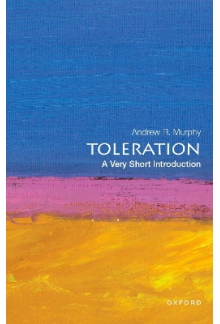- Home
- All Categories
- Toleration (A Very Short Intro duction)
Andrew R. Murphy
Toleration (A Very Short Intro duction)
Voted 0
ISBN: 9780197664957
Author : Andrew R. Murphy
Published: 2025
Publisher: Oxford University Press
Number of pages: 152
Language: English
Format: Paperback
Author : Andrew R. Murphy
Published: 2025
Publisher: Oxford University Press
Number of pages: 152
Language: English
Format: Paperback
Full price:
12.00 €
- % When buying online
Price:
Whe don't have this product
Delivery in Lithuania within 3-5 weeks. Delay is possible
In stock. Delivery in Lithuania within 1-4 working days
Delivery in Lithuania within 3-5 weeks. Delay is possible
Delivery conditions
Description
""It is now no more that toleration is spoken of," President George Washington wrote to the Hebrew Congregation of Newport, Rhode Island, in 1790, "as if it was by the indulgence of one class of people, that another enjoyed the exercise of their inherentnatural rights." Despite Washington's confident assertion that the young nation had moved beyond toleration, however - to say nothing of the countless Americans who, even as he wrote, had yet to enjoy "the exercise of their inherent natural rights" - toleration is still "spoken of." Celebrated by some, excoriated by others; praised as a noble aspiration in some settings, lamented as a half-hearted half-measure in others, toleration continues to evoke roughly equal parts admiration and condemnation in a polarized world riven by religious discord and cultural conflict. Depending on one's perspective, it represents a cardinal achievement of modern political regimes, a grudging and insufficient measure of civil respect, or a set of practices hopelessly tainted by their association with imperialism, colonialism, and Eurocentrism. Or, perhaps, a bit of all three"--Toleration is one of the most foundational and contentious concepts in contemporary political discourse. Although its modern origins lie in the realm of religious dissent, toleration remains one of our most contentious and broad-ranging concepts, invoked in today's debates about race, gender, religion, sexuality, cultural identity, free speech, and civil liberties. Questions of toleration arise wherever unpopular groups face hostile environments and stand in need of protection from state interference or the actions of their neighbors.
Toleration can seem counterintuitive at first glance, since it involves a complex mixture of rejection and acceptance, combining disapproval - of particular individuals, groups, beliefs, and practices - on the one hand with legal and political guarantees for such groups on the other. Toleration has long been considered a cardinal virtue of liberalism, endorsed by central figures such as Locke, Mill, and Rawls. Although toleration has been criticized as unduly minimal, compared with more expansive terms such as recognition or acceptance, it has routinely played a key role in the protracted struggles of marginalized groups of various sorts (a necessary, if not always sufficient, condition for liberty). Toleration: A Very Short Introduction will concisely canvass the history, development, and contemporary global status of toleration as both a concept and a contested political and legal practice.
Toleration: A Very Short Introduction concisely canvasses the history, development, and contemporary global status of toleration as both a concept and a contested political and legal practice. Although its modern origins lie in the realm of religious dissent, toleration remains one of our most contentious and broad-ranging concepts, invoked in today's debates about race, gender, religion, sexuality, cultural identity, free speech, and civil liberties.
Reviews (0)
Write a review

